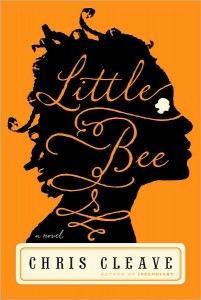I have a tendency to avoid books that are really popular. Either I worry that the book won’t live up to the hype, or I feel like once I’ve read a hundred reviews of a book, I won’t be able to experience it anew, or I am just snobby that way. (Yes, I admit it.) For many years, Little Bee by Chris Cleave fell into that category of best-sellers I have avoided, joining others such as Eat Pray Love and Fifty Shades of Grey. (Incidentally, The Help WAS on the list, as was Room for a while, but curiosity got the better of me and I actually enjoyed them both. Also, I read Gone Girl before it exploded, so it never made it onto the list.)
 So, Little Bee. I decided to take the plunge once I learned that the audio version was narrated by the extremely talented Anne Flosnik, who is also a friend of EDIWTB. For those who haven’t read it, it’s the story of a 16 year-old Nigerian refugee who has been in a London immigration detention facility for two years. She manages to get released, and tracks down a suburban couple – Sarah and Andrew – who she met two years earlier on a Nigerian beach. The events that transpired on that beach were horrific, and had serious ramifications for each of the three. Little Bee was forced to flee after witnessing the brutal murder of her sister, while the incident signaled the death knell for Sarah and Andrew’s marriage. They left Nigeria both physically and emotionally ravaged.
So, Little Bee. I decided to take the plunge once I learned that the audio version was narrated by the extremely talented Anne Flosnik, who is also a friend of EDIWTB. For those who haven’t read it, it’s the story of a 16 year-old Nigerian refugee who has been in a London immigration detention facility for two years. She manages to get released, and tracks down a suburban couple – Sarah and Andrew – who she met two years earlier on a Nigerian beach. The events that transpired on that beach were horrific, and had serious ramifications for each of the three. Little Bee was forced to flee after witnessing the brutal murder of her sister, while the incident signaled the death knell for Sarah and Andrew’s marriage. They left Nigeria both physically and emotionally ravaged.
The fact pattern here is compelling. But it was given poor treatment by Cleave, who wrote what is basically a parable. Ultimately, I found Little Bee to be contrived, implausible and shallow. There were so many conversations that barely scratched the surface of what the characters SHOULD have been talking about. I kept thinking to myself, “This never could have happened.” or “That’s not what this person would have said at this juncture.” or “Seriously?” Cleave clearly wanted to tell a story about globalization and human rights, and on a more personal level, the sacrifices one human being will make to protect the well-being of another. I get that. But the book he wrote was really just a fable. There was no emotional heft to it. Some really disturbing stuff happened, and some very important issues were touched on, but the characters were about an inch deep.
I am really surprised that this book was so well-received. My paperback version has a few pages of blurbs, the novel itself, an afterword from the author, book club discussion questions, and a Q&A with Cleave. Clearly this was a popular book. I just don’t get it.
What salvaged this reading experience for me was the audio version. It is narrated by Anne Flosnik, and her performance is exquisite. She does Little Bee’s voice in a Nigerian accent that she maintains perfectly throughout the whole book, without ever deviating. And she moves seamlessly between Little Bee and Sarah. I have a lot of admiration for Flosnik’s performance. She had to narrate some very disturbing scenes, which she did without unnecessary drama. Her even, almost dream-like narration actually had the effect to me of heightening the parable-esque quality of the book. Were it not for Flosnik’s narration, I might have given up on Little Bee long ago. So while I didn’t like the book, I do recommend the audobook for the sheer pleasure of listening to Flosnik’s interpretation.
I know that I am in the minority here, but this book was really not for me.










About Me
I have been blogging about books here at Everyday I Write the Book since 2006. I love to read, and I love to talk about books and what other people are reading.